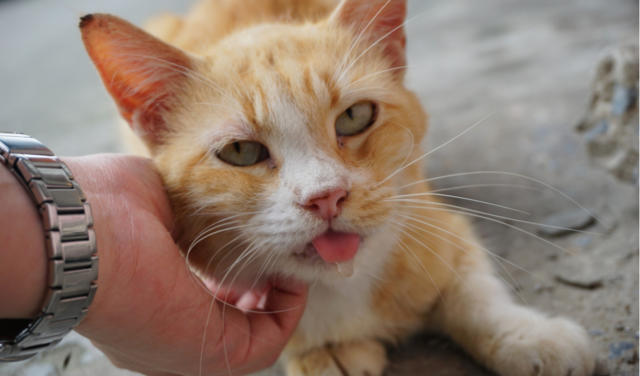Drooling is common in our pets, such as dogs. But things are very different for cats, as the fact that a drooling cat can signal several possible and health problems that can even involve a vet if needed.
Cats with anxiety, stressed, afraid, or feel depressed will usually drool, but this is only temporary, as well as when they sleep or purr.
However, a drooling cat can become worrying if it keeps drooling even when doing other activities, some of the things that underlie this are conditions and health problems in cats, and this is why your cat is drooling.
- Dental Disease
Feline resorptive lesions often called (feline odontoclastic resorptive lesions or FORL) are a common cause of dental disease in cats and result in mouth pain and more saliva flow.
FORL, also called cervical line erosion, cavities, neck lesions, and external or internal root resorption can occur at the level where the gum line meets the tooth.
Usually, FORL can be seen as a red line along with your cat’s mouth. However, if your cat has a lot of tartar (hardened plaque) on top of the teeth, it may be hiding gum lesions.
FORL is very painful and can cause mouth sensitivity, tooth fracture, discomfort, bad smell from the cats’ mouth, and saliva. Left untreated, this can lead to chronic pain in your cat and even weight loss.
- Kidney Failure
One of the number one cat killers is kidney failure, and it can be seen in acute or chronic conditions. Chronic renal failure (CRF [also known as chronic kidney injury or CKI) can cause clinical signs of weight loss, increased thirst, increased urination (noted by larger clots of urine in the litter box), diluted urine, halitosis (ie, bad breath), and saliva.
The kidneys usually filter BUN and creatinine (two waste products of the body) out. When these levels build up in the bloodstream, they produce uremic ulcers in the mouth, esophagus, and stomach. Kidney failure is not common diseases on cat, hence you should pay attention to your cat’s condition.
- Corrosive Poison
Because cats have altered liver metabolism (called glucuronidation) when compared to dogs, they can’t metabolize drugs or chemicals either. Certain household products such as laundry detergent, liquid potpourri, and other cleaners can irritate dogs (causing common signs such as vomiting and diarrhea) but can be damaging to cats.
This can cause burns in the mouth, on the tongue, and the esophagus and stomach. Accidental poisoning can cause severe drooling.
If you think your cat is doing something corrosive, try to gently flush its mouth with water and offer something delicious (like chicken stock, canned tuna water, milk, etc.) to flush the throat and flush out toxins from the mouth. But if you doubt it, contact your veterinarian immediately.
- Poisonous Plants
Certain poisonous plants contain insoluble calcium oxalate crystals and can cause severe burns when a cat accidentally swallows them. These plants are like:
- Calla lily
- Lilium
- Dieffenbachia lilies
- Laceleaf
- Johannesteijsmannia
- Dracaena trifasciata
- Trauma
There are important safety reasons that a cat should stay inside. Besides to preventing your cat fighting other animals. It will also help minimize the risk of trauma (for example, being hit by a car, being attacked by a dog, etc)
An emergency care specialist, frequently see cats have severe jaw fractures after trauma, and a luxurious temporomandibular joint or jaw fracture can cause severe salivation (due to the inability to close the mouth).
You also can see this signs your cat has trauma that you should pay attention to. But if you still in doubt, seek veterinary attention immediately for a thorough oral examination and possible x-rays.
- Foreign Object
Rarely, because of cats behaviour they may accidentally swallow the thread while the needle is still attached. An unusual foreign object can become lodged in the tongue, soft or hard palate, or back of the throat, resulting in mouth pain, drooling, and the inability to close the mouth.
- Cancer
Cats, especially those with white skin with a lack of pigmentation – may be at an increased risk of developing a malignant and aggressive cancer called squamous cell carcinoma (SCC). Although it can develop anywhere, SCC often develops in the eyes, mouth, and ears.
Clinical signs of cancer – especially in the mouth – can include:
- Drooling
- Breath Stink
- Not eating
- Dropping food from the mouth
- Weight loss
- Inability to close the mouth

